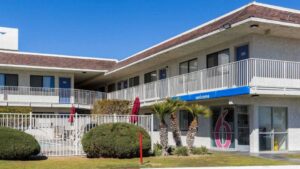Coronavirus Fallout May Test Commercial Real Estate Industry’s ‘Extend and Pretend’ Limits
Coronavirus Fallout May Test Commercial Real Estate Industry’s ‘Extend and Pretend’ Limits
Sacramento Business Journal
03/27/20
Coronavirus Fallout May Test Commercial Real Estate Industry’s ‘Extend and Pretend’ Limits
Emily Hamann & Ben van der Meer
The last time the U.S. economy was in crisis, terms such as “jingle mail” and “extend and pretend” became commonspeak among the thousands of men and women earning their keep in the commercial real estate sector. What’s unfolding today in the age of the coronavirus undoubtedly will add to that insider vocabulary, and then some.
A Business Journals analysis of the commercial real estate market identified 4,600 properties securing $30 billion in commercial mortgage-backed securities, or CMBS, debt coming due in the next six months. With the global economy in a tailspin and nary a sign of it stabilizing, the likelihood those loans will be paid in full — whether through refinancing or property sales that can satisfy lenders — is slim.
The shrapnel from this ticking time bomb will be absorbed in virtually every major metropolitan area in the country. In Washington, D.C., some $1.8 billion in CMBS debt secured by 67 properties is coming due by Sept. 30. In Los Angeles and Boston, the totals are $1.46 billion and $1.31 billion, respectively, and the combined number of affected properties is 240.
The hotels of Sacramento
The Sacramento region has $229 million worth of CMBS debt, and most of it is secured by the type of properties that are among the worst hit by the outbreak. Most of the region’s 77 properties securing this type of debt maturing soon are part of larger regional or national portfolios — all of them hotels.
Manus Clancy, senior managing director and head of applied data, research and pricing at mortgage research firm Trepp LLC, said it’s likely that lenders will have to be flexible.
“I think the special services are going to be incredibly accommodating,” he said. “Otherwise they are going to be foreclosing on things that they can’t even sell.”
Trepp also recently put together a list of some of the most exposed hospitality properties in Sacramento.
Borrowers still owe $22.3 million on the Hilton Sacramento Arden West, and according to Bloomberg data, that’s due July 1. Other hotel properties carrying big loan balances heading into the coronavirus outbreak include The Citizen Hotel ($34 million due), which just sold last year, and the Hyatt Place Roseville ($17 million due).
Just a few weeks ago, the Sacramento hotel market was exceeding expectations — some hotels had occupancy rates around 90%, despite the Sacramento Convention Center being closed for remodeling and expansion.
But as the spread of the virus brought travel to a halt, tens of thousands of room nights disappeared almost overnight. Now some hotels are seeing occupancy in the single digits.
The Hyatt Regency Sacramento, the city’s largest hotel at 505 rooms, has stopped taking reservations altogether.
Other hotels are dealing with an additional layer of problems, as loans for some of these properties, both CMBS and conventional, come due in the next few months, or even years, as the travel industry recovers from this unprecedented drop off in business.
“It’s completely uncharted territory,” said Alan Reay, president of Irvine-based hotel brokerage firm Atlas Hospitality Group. “We’ve never seen anything like this.”
Even during the last financial crisis, people who could afford to were still traveling, unlike now.
“What happened in the other downturn was the rate went down, but occupancy was still there,” Reay said. That meant many hotels could still pay their bills, and make loan payments.
That likely won’t be the case this time. But Reay thinks most borrowers will be able to work out some kind of agreement with lenders.
“The incentive for the lenders to work with the borrowers is huge,” he said. “They have to.”
Otherwise, lenders’ other option is to foreclose, and be stuck holding the keys to an empty hotel, with no revenue stream, as thousands of similar properties around the country hit the market at once.
Or, borrowers might decide to simply walk away, Reay said, as many did during the recession, which had a ripple effect on cities around the country.
“What lenders certainly don’t want to see happen, as well as cities, is hotels, especially in the downtown being abandoned,” he said.
Landlords hold the key
In New York City, home to the largest concentration of CMBS debt, some $3.96 billion in loans backed by 181 commercial real estate properties is slated to mature within the next 180 days. According to Bloomberg data, the most prominent Big Apple properties scheduled to mature include 280 Park Ave. ($1.08 billion loan due Sept. 16), which is owned in partnership by S.L Green Associates and Vornado Realty Trust, and 731 Lexington Ave., another Vornado property with a $500 million loan coming due in June.
A call and email to Vornado were not returned.
Commercial real estate experts agree it’s too early to tell how or when the market’s vulnerabilities will come to the fore as the global economy implodes under the strains of the COVID-19 pandemic, but what’s clear is the dominoes are in motion: a growing number of tenants are unable to generate revenue for rents; their landlords will soon lack the means to make mortgage payments in full; and property lenders, already desperate for cash, are watching a global liquidity crunch manifest.
Jeffrey Langbaum, a Bloomberg analyst tracking the commercial real estate industry, said landlords hold the keys — literally and figuratively — when it comes to weathering the storm. He predicts that much will depend on the sectors in which landlords operate and the extent the federal government steps in to offset lost rental revenue and mortgage obligations.
“This White House appears to have a soft spot for commercial real estate landlords,” said Langbaum, noting President Donald Trump’s long history in the industry.
Public-facing businesses
Local commercial real estate brokers largely shied away from predicting the fallout from COVID-19 in upcoming months, citing among other factors the unpredictability of how long much of the economy will be shuttered.
But a broker who wrote a book a decade ago about fallout from the Great Recession said the obvious first point of pain this time will be “public facing” businesses. That includes not only obvious operations such as restaurants and retailers, but office settings, such as real estate offices, where there’s frequent visitation from the outside.
“It’s as if you just turned it all off for two weeks, but you can’t do that,” said Tony Wood, of KW Commercial. “Hopefully, in the short term, it’s like a mandatory vacation.”
In some cases, landlords may prefer to work out something rather than move immediately to evicting a tenant, Wood said.
But that means those landlords, commercial property owners, in turn, may have trouble meeting their own obligations.
Rex Hime, CEO of the California Business Properties Association, said his members will want to take part in talks at every level of government on finding relief.
He said deferring tax payments might be one way to stave off pain. “It really depends what kind of bills you put off,” Hime said.
At the same time, evictions don’t happen quickly, he said. But smaller businesses may be the ones that are most affected.
Wood and Hime both said the last downturn taught lessons to businesses and property owners they’re applying now. Banks don’t typically want to own properties; an empty storefront doesn’t do a building owner much good if the economy is weak overall.
Hime said the time for government policy to make a difference is now. If businesses are still mostly shuttered in five or six months, any steps policymakers take then would probably be too late, he said.
The shutdown of most public facing businesses as a result of COVID-19 has been considerable.
Homebase, a software company used by small businesses for functions such as scheduling and tracking employee hours, saw 27% of its Sacramento client businesses close entirely during the third week of March.
Company CEO John Waldmann said in an email that the firm compared its figures for that week to the month of January, typically a slower time for retail sales. In the Sacramento metropolitan statistical area, San Francisco-based Homebase has about 500 clients, meaning 135 stopped using Homebase’s services suddenly last week.
Of those, according to Waldmann, about 30% were food-and-drink businesses, the largest by percentage of any classification.
Are banks on the coronavirus hook?
Banks hold the majority of the nation’s commercial mortgage debt, with small banks in particular accounting for approximately two-thirds of those loans. Federal loan data indicate there was approximately $1.5 trillion in commercial real estate debt on the books of U.S. banks at the close of 2019, with Wells Fargo & Co., Bank of America Corp. and JPMorgan Chase & Co. accounting for about 13% of that total. CMBS loans account for about 50% of the U.S. commercial real estate loan market.
Real estate experts interviewed for this story cautioned it is too early to tell whether banks ultimately will absorb whatever fallout is to come from the coronavirus crisis, or whether landlords will break with tradition and negotiate down lease contracts to accommodate struggling tenants. They also agreed lenders have no desire to take ownership of properties if it can be avoided.
Bloomberg’s Langbaum said he takes some comfort in knowing lenders and landlords alike are far better capitalized vs. 2008, when it was commonplace to see loan terms for overdue mortgages extended indefinitely — a practice known as “extend and pretend” — or for property owners to simply turn in keys — “jingle mail” — and walk away from properties.
What also was different then, he said, was the economic fallout was far more gradual than what’s unfolding today.
“There are so many balls in the air right now it’s impossible to see where the pain points will emerge,” Langbaum said.


